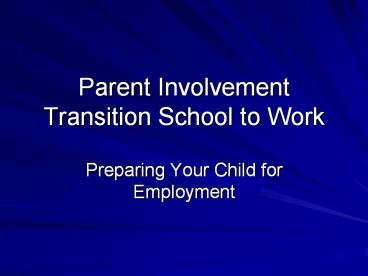Parent Involvement Transition School to Work - PowerPoint PPT Presentation
1 / 14
Title:
Parent Involvement Transition School to Work
Description:
Work-based learning during the school years leads to ... Volunteer experiences and unpaid internships, in addition to ... encouraging youth to volunteer in ... – PowerPoint PPT presentation
Number of Views:98
Avg rating:3.0/5.0
Title: Parent Involvement Transition School to Work
1
Parent InvolvementTransition School to Work
- Preparing Your Child for Employment
2
Why Focus on Employment?
- Work-based learning during the school years leads
to better post-school employment outcomes
(Hughes, Moore, Bailey, 1999). - Volunteer experiences and unpaid internships, in
addition to paid employment, can be
steppingstones to future employment.
3
Why?
- Recent studies demonstrate the
effectiveness of using personal networks as a job
search strategy (Timmons, Hamner, Boes, 2003),
and highlight the fact that families make key
contributions to successful employment outcomes
for individuals with disabilities (26th Institute
on Rehabilitation Issues, 2000).
4
How can Parents Help?
- Combine community relationships, a
- young persons interests, and family or
- personal networks to help a young person
- effectively explore work-based learning
- outside of school settings.
5
How?
- Help your sons or daughters explore their
- unique abilities, strengths, and interestsall
- of which may lead to an appropriate career
- path.
6
How?
- Use practical strategies to prepare them for
employment by - assigning chores at home
- encouraging youth to volunteer in their community
- keeping an eye open for employment opportunities
- discussing different careers in the community
7
How?
- Teach youth to be self-advocates while searching
for a good job. - share your insight and information, with the IEP
Team, which may serve as a basis to determine
strategies and services for the transition IEP
goals.
8
What are Self Determination Skills?
- Self-knowledge. Know skills, abilities,
strengths, and limitations. - Goal setting. Set appropriate goals and work
toward them. - Problem solving/decision making/choice making
skills. - Self advocacy. Speak up for oneself, know
rights, understand health disability.
9
Why Teach Self Determination?
- Ultimately, to be successful in the
- workplace, youth must develop skills to
- become as independent as possible.
- Research supports the idea that youth who leave
high school with self-determination skills have a
greater chance of achieving positive post-school
outcomes than those who do not. (Wehmeyer
Schwartz, 1997).
10
How Can Parents Help?
- Parents can help their children develop
self-determination skills by creating a
supportive environment, which allows youth to
take risks, test their abilities and limitations,
develop their problem solving skills, and
practice positive work habits and behaviors.
11
Whose Future Is It?
- Although parents can do much to launch
- their sons and daughters into the work force,
- their childrens future is their own.
12
You can make a difference through positive
transition planning!
13
Questions?
- If you would like more information about
the transition process contact Jane Winstead,
Director of Transition Services, Tennessee
Department of Education, Division of Special
Education at - Jane.winstead_at_state.tn.us
14
References
- Material adapted from a publication of the
National Center for Secondary Education and
Transition (NCSET) - Preparing for Employment On the Home Front
- The entire publication is available on the Web
at http//www.ncset.org/publications/viewdesc.asp
?id2844































